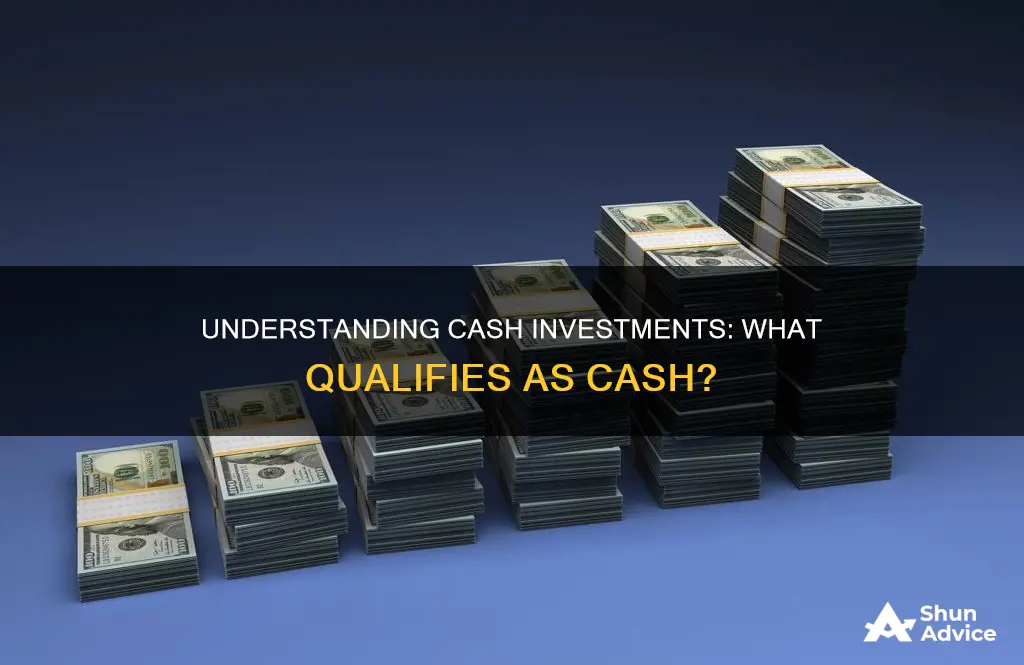
Cash investments, also known as cash equivalents, are short-term, highly liquid investments that can be converted to cash quickly and easily with little to no loss in value. They are meant for investors who are looking for a safe investment and to preserve their capital. Money market accounts, certificates of deposit, treasury bills, and money market funds are all examples of cash investments. Cash investments are important for striking a balance between investing, risk, and liquidity. They are also a good way of managing money to meet short-term goals and to provide a safety net for emergency expenses.
| Characteristics | Values |
|---|---|
| Type of Investment | Short-term |
| Liquidity | High |
| Risk | Low |
| Maturity Period | Less than 3 months |
| Returns | Low |
| Examples | Money market accounts, Money market funds, Treasury bills, Commercial paper, Certificates of deposit |
What You'll Learn

Money market accounts
Some money market accounts offer check-writing and debit card privileges, allowing you to access your savings with an ATM card and providing more flexibility to withdraw your savings without incurring penalties.
- Quontic Bank: 5.00% APY, $100 minimum deposit
- Vio Bank: 4.90% APY, $100 minimum deposit
- CFG Community Bank: 4.80% APY, $1,000 minimum deposit
- UFB Direct: 4.31% APY, no minimum deposit
- EverBank: 4.30% APY, no minimum deposit
- Sallie Mae Bank: 4.20% APY, no minimum deposit
- Ally Bank: 4.00% APY, no minimum deposit
Investing Inflow: The Key to Positive Cash Flow?
You may want to see also

Money market funds
One of the key advantages of money market funds is that they offer better returns than traditional bank savings accounts while providing high liquidity and low risk. They are an attractive option for investors who want to park their cash temporarily before investing elsewhere or making anticipated cash outlays. Additionally, money market funds do not have entry or exit charges, and some funds provide tax advantages by investing in municipal securities exempt from federal and state taxes.
However, money market funds are not suitable for long-term investment goals like retirement planning, as they offer limited capital appreciation. They are sensitive to interest rate fluctuations and monetary policy changes. While money market funds are considered safe, investors should be aware that the principal value is not guaranteed and may fluctuate.
Understanding Cash Investment: Credit or Debit?
You may want to see also

US Treasury bills
T-bills are typically sold in denominations of $100 and can be purchased directly from TreasuryDirect, the platform of the US Treasury, or from a brokerage firm. They are available with maturity dates ranging from four weeks to 52 weeks, providing investors with a short-term investment option. T-bills are also highly liquid and can be easily bought and sold in the secondary bond market.
The interest income from T-bills is subject to federal income tax but is exempt from state and local income taxes. T-bills offer a low minimum investment requirement of $100, making them accessible to a wide range of investors. However, it is important to note that T-bills do not provide periodic interest payments, which may be a consideration for investors who require steady income. Additionally, T-bills have interest rate risk, which means their rate could become less attractive in a rising-rate environment.
Overall, US Treasury bills are a safe and secure investment option for those seeking a short-term, low-risk opportunity. They are particularly suitable for investors looking to preserve their capital and maintain liquidity while earning steady, albeit typically low, returns.
Cash Investments: What Are They?
You may want to see also

Short-term bond funds
- Vanguard Short-Term Treasury Idx Admiral – This fund has a 0.07% expense ratio for mutual funds and 0.04% for ETFs.
- Schwab Short-Term US Treasury ETF™ – This fund has a 0.03% expense ratio.
- Vanguard Short-Term Treasury ETF – This fund has a 0.04% expense ratio.
- SPDR® Portfolio Short Term Treasury ETF – This fund has a 0.03% expense ratio.
- PGIM Short Duration Mlt-Sect Bd ETF – This fund has a 0.40% expense ratio.
- Baird Short-Term Bond – This fund has a 0.55% expense ratio and an effective duration of 1.84 years.
- JPMorgan Limited Duration Bond ETF – This fund has a 0.24% expense ratio.
- PGIM Short-Term Corporate Bond – This fund has a 0.38% expense ratio and an effective duration of 2.66 years.
- SPDR Portfolio Short-Term Corporate Bond ETF (SPSB) – This fund offers exposure to U.S. corporate bonds with maturities between one and three years. It has a 0.04% expense ratio and a 4.48% SEC yield.
- IShares 1-5 Year Investment Grade Corporate Bond ETF (IGSB) – This fund holds bonds issued by Bank of America, Wells Fargo, and Microsoft. It has a 0.04% expense ratio and a 4.60% SEC yield.
- Schwab 1-5 Year Corporate Bond ETF (SCHJ) – This fund holds corporate bonds with remaining maturities between one and five years. It has a 0.03% expense ratio and a 4.47% SEC yield.
- Vanguard Short-Term Bond ETF (BSV) – This fund holds government bonds, high-quality corporate bonds, and investment-grade international dollar-denominated bonds. It has a 0.04% expense ratio and a 4.11% SEC yield.
- Fidelity Short-Term Bond Fund (FSHBX) – This fund typically invests at least 80% of its assets in all types of investment-grade debt and maintains a dollar-weighted average maturity of three years or less. It has a 0.30% expense ratio and a 4.39% SEC yield.
Unlocking the Power of Idle Cash: Smart Investment Strategies
You may want to see also

Certificates of deposit
When opening a CD, there are several factors to consider, including the interest rate, term length, principal amount, and the policies of the financial institution. Most CD interest rates are fixed, but there are also variable-rate options that could earn a higher return if rates rise. The term length is the period of time that you agree to leave your funds deposited without incurring a penalty. Principal refers to the amount you agree to deposit when you open the CD, and financial institutions set policies such as early withdrawal penalties.
CDs are a good option for those who want to earn more than what is offered by most savings or checking accounts without taking on more risk. They are also suitable for those who want to save for specific goals, such as a vacation, a new home, or a car. Additionally, CDs can help investors achieve lower risk and volatility compared to investing in the stock and bond markets.
However, one of the downsides of CDs is the lack of flexibility in withdrawing funds early, which typically results in a penalty. CDs may also earn less than stocks and bonds over time, and the fixed rate could be a disadvantage if interest rates rise during the term. Inflation can also impact the value of money locked in at a fixed rate.
Cash Flows: Investing Activity or Not?
You may want to see also
Frequently asked questions
Cash investments are short-term, highly liquid, low-risk investments that are readily convertible to cash. They are also known as cash equivalents.
Examples of cash investments include money market accounts, money market funds, certificates of deposit (CDs), US Treasury bills (T-bills), and short-term deposits in financial institutions.
Cash investments provide high liquidity, minimal market risk, and a short maturity period, usually less than three months. They are suitable for investors looking for a safe and temporary place to keep their cash while researching other investment options.
When choosing a cash investment, consider factors such as liquidity needs, risk tolerance, and investment goals. Compare different options like cash management accounts, money market funds, and CDs based on accessibility, potential returns, and FDIC insurance coverage.







